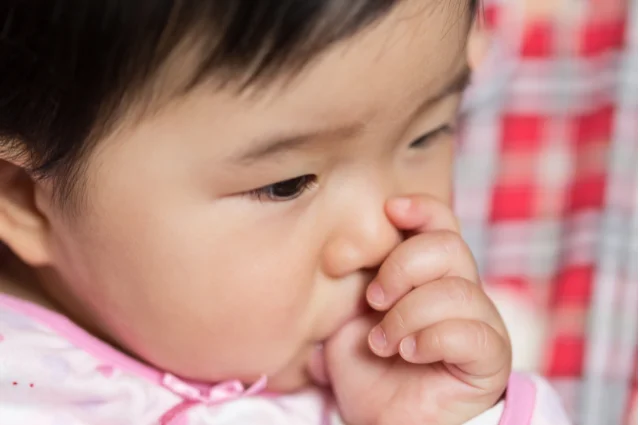It is common to see babies sucking because they are born with a natural instinct to suck on anything they find. That is an essential reflex that helps them to survive, feed, and soothe themselves. One of their favorite objects to suck is their thumb. At what age do babies find their thumb? Usually, babies will find their thumb between 2 and 4 months. At that stage, they will begin to explore their hands and fingers, and putting them into their mouths is their way of understanding them better, among other reasons.
Hey! By the way… any links on this page that lead to products on Amazon are affiliate links and I earn a commission if you make a purchase. Thanks in advance – I really appreciate it! .
Benefits of thumb-sucking
It’s a common habit for babies to suck their thumbs. Even though some parents do view thumb-sucking as not nice, the act actually offers some benefits to your child. Below are some benefits of thumb-sucking:
- Comfort and relaxation: Babies feel comfort and peace when they suck their thumbs. That happens mostly when they are upset or anxious. By sucking their thumb, they can feel relaxed and secure again.
- Self-soothing: Babies can self-soothe and regulate their emotions when they suck their thumbs. Rather than remain cranky for a long time, some babies quickly overcome such emotions by sucking their thumbs. They can also satisfy their urge to suck when they do so.
- Oral stimulation: Babies get oral stimulation when they suck their thumbs. That is essential for their speech and oral development.
- Sleep aid: Sucking the thumb can easily make some babies fall asleep. It is rare to see a thumb-sucking baby having problems with sleep. They are also able to sleep longer by sucking.
Despite the many benefits of thumb-sucking, moms need to regulate the amount of time their babies spend in this act. You should not allow your baby to overly suck their thumbs to avoid dental problems.
How to help baby find the thumb
It’s natural that most babies will find their thumbs on their own as they explore their fingers and hands. If they are, however, finding it difficult to do so, you could encourage them in a few ways like:
- Placing their toys within their reach. This gives them the opportunity to become more aware of their hands and fingers since they have to reach out for the toys with that part of their bodies.
- Gently guiding their hands and finger to their mouths. With time they will get comfortable with their hands and start to put their fingers in their mouth.
- Not swaddling your baby too tight. This gives them the chance to still explore their fingers.
Is sucking hereditary?
No, there is no scientific proof showing that sucking is hereditary. Thumb sucking cannot be inherited from parents. Though genetics can play a major role in how a child’s oral habits are formed, there is more probability that other factors do influence their behavior. Factors like stress, environment, and childhood experiences do influence if a child will suck their thumb or not. Babies will naturally start to suck their thumb when they need soothing or want to calm themselves. Others will begin to develop the habit of sucking to sleep better at night.
Thumb sucking vs pacifiers
Using the pacifier and thumb-sucking are common habits in babies. Both acts can help comfort babies and provide them with a sense of security. However, these two habits have some differences.
Thumb-sucking is a natural reflex that babies develop right from the womb. On the other hand, Pacifiers are artificial products manufactured to provide babies with the same benefits that thumb-sucking offers.
Babies can self-soothe anytime and anywhere they want by sucking on their thumbs. Though they can also self-soothe with the pacifier, it can get lost or taken away from them at any time, which could result in cranky behaviors.
While it can be difficult for moms to stop their babies from thumb-sucking, weaning them off a pacifier is simpler.
Besides, the pacifier can be used as an alternative for babies when trying to stop them from thumb-sucking.
Prolonged thumb-sucking and pacifiers have disadvantages, as both can cause dental problems and introduce germs to the mouth if there are no proper sanitary conditions.
Conclusion
At what age do babies find their thumb? While babies unconsciously begin to suck their fingers right from when they are in the womb, they still have to discover them after birth. They start to explore their hands as early as two months of age. Their need to find comfort, security, and calmness eventually helps them find their thumbs. By sucking on them, they can self-soothe themselves when they are angry or uncomfortable about anything.


